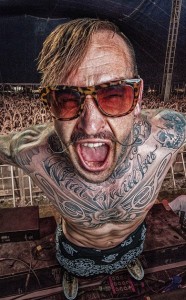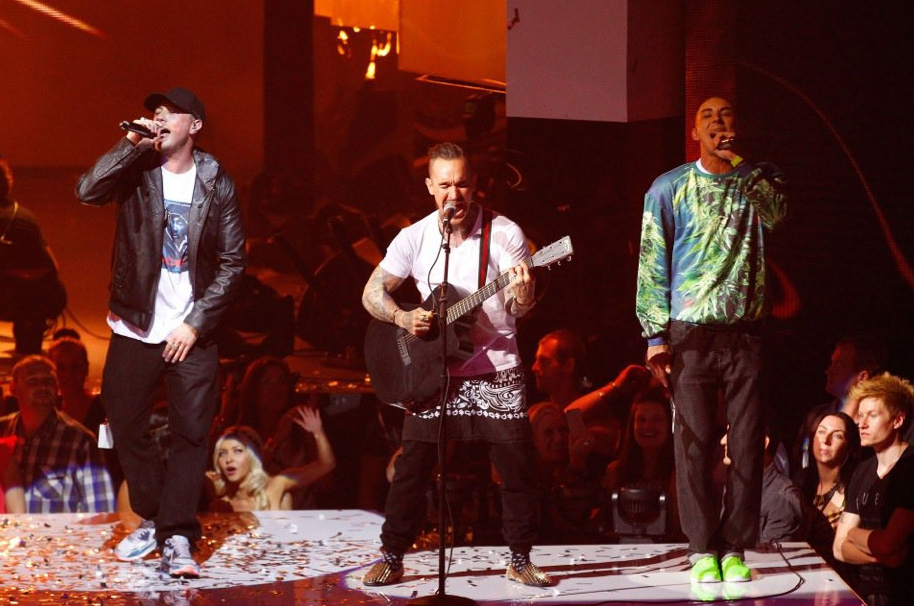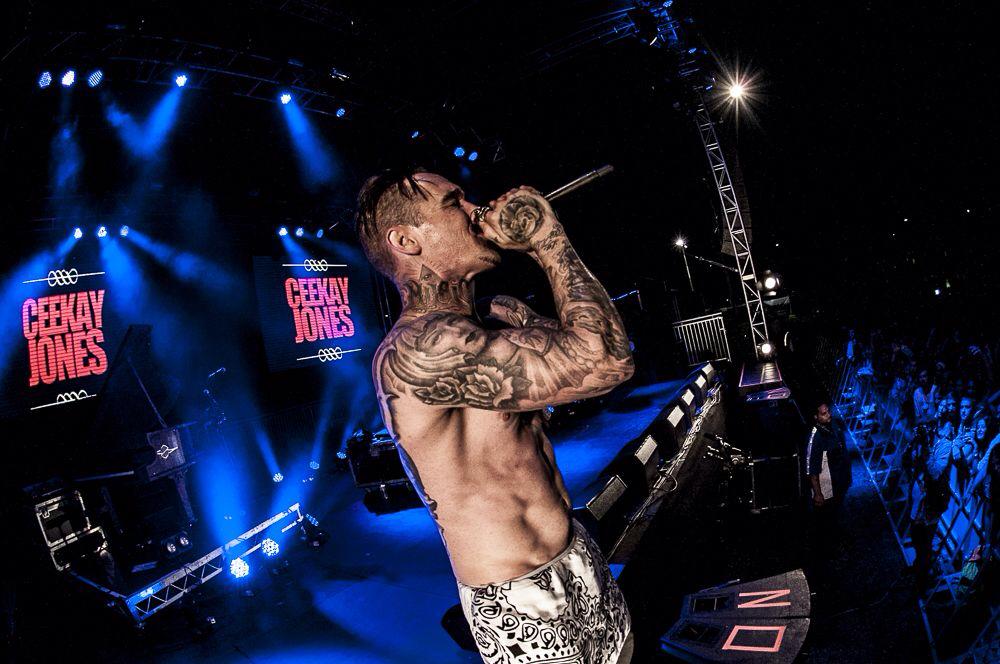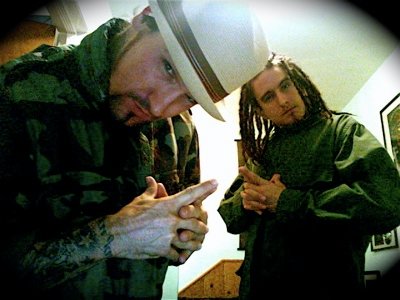Kiki Shakti interviews Taos’ very own Ceekay Jones, who is playing aqui en Taos this Friday at KTAO. Five-7-Five opens.
1. Did you grow up In Taos?
Yes, I did. I was born in New York, but I came to Taos at a really young age, like when I was eight years old, so to me, I’m from Taos.
2. So, you were a founding member of TabulaRasa, which we all remember fondly here in Taos. How did that get started?
Well, that started in the late ‘90s, like ‘99. In the late ‘90s, I was a professional snowboarder. That’s why I left Taos, because at that time, obviously, Taos didn’t allow snowboarding. I was in the middle of rehabbing a knee surgery and I came back to Taos to just kind of hang out with some friends. Norman, the drummer for Tabularasa, also many other acts in Taos now [such as Friday’s opening act, Five-7-Five], was my good friend and we ended up jamming. Marcos was also doing stuff with Norman at the time, and then Giles came in within that year. So, the actual Tabularasa itself formed in about 2000-early 2001. We were all just a bunch of guys — friends hanging out and jamming, making music. And then somebody decided to book a gig, and we all ended up going. We didn’t really have any problem, we just freestyled and jammed, and it worked out well, so…
3. How long did that go on?
Tabularasa was full on till about 2005. We toured heavily. We left Taos after the first year, and moved into what was first a van — a 1978 van — and then we moved into an RV. For four and half years, the four of us literally lived in that RV full-time, whether we had shows, or not. We had one cell phone and we pretty much just drove around the country, booking shows, flying by night, just doing it DIY style. And, we built a pretty great fan base. We based ourselves out of Southern California, because, you know weather-wise, when you’re living out of an RV, it’s a good place to be.
So, we were based out of Los Angeles and San Diego, and up until 2005, it was full-time. That’s when we started to slow down; you know, people start having other things to do. We didn’t disband at that point. For the next five years, it was a slow digression. We never had a full break-up; we’ve all just kind of slowly gone and done our separate things. It’s gone from shows every single day/all week, to shows once or twice a month, to shows once or twice every six months, to a show once a year, to now we’re at, probably, a show every couple of years.
4. So, what have you been doing since that has stopped being your primary focus?
In 2005, at the peak of what we were doing, we did the Van’s Warped Tour. On the Van’s Warped Tour, I ended up networking with Danny Boy from House of Pain. And House of Pain was one of my favorite groups growing up; so, being able to link up with Danny Boy and meet him was a big thing. But, what was just meeting ended up turning into a close friendship and I ended up working– I’m going to fast track this, because it’s long story. What I’ve done since Tabularasa is way more extensive than what I did with Tabularasa, and I want you to get the whole story so, I’m going to try to be concise:
I started working with Danny Boy, and he linked me in with Everlast, and DJ Diesel. I then started working around the Cypress Hill camp with B-Real and everybody – just a lot of the LA hip-hop scene. Through that, I was a part of the early stages of what would become kind of a hip-hop group – kind of a supergroup – with different members, called La Coca Nostra. La Coca Nostra was, what I call a supergroup of well-known, underground, white rappers. All of House of Pain was involved, Ill Bill from Non-Fiction in New York City was involved and there are a lot of others. So, it was like a big group of all underground MCs who were grouped together and called La Coca Nostra. I was involved with them in the early stages.
From that, I was asked to go out on the road with the New York hardcore legend, Danny Diablo. I went out on a big national tour with him, helping out on his tour with his band, and doing my own stuff, as well. That friendship turned into a 3 ½ year working relationship, where I toured all over with him and his solo project. At the time, he was signed to Travis Barker’s label [La Salle Records]; so, he was really pumping his solo career. But, he was also from the original New York hardcore days, CBGB’s and stuff. He had two bands that did really well. One was called Crown of Thornz and the other was Skarhead. In the time I was touring with him, he got asked to do another Skarhead record. So, he assembled a band to be Skarhead and he asked me to be a part of that band. We recorded a record in New York City in 2009, and then we ended up doing three world tours from 2009 to the end of 2010. That was a big time that I just spent on the road all over the world with him. It was an amazing tour and I got to play some amazing festivals and places that I never thought that I would ever get a chance to play music. That was really fun.
In 2010, right at the end of that, I just realized that, for me, hard-core music wasn’t really where my heart was. I realized that I had strayed from my own personal place in music. So, I quit Skarhead and I focused on myself for the first time (rather than working with groups and bands) and that was kind of the start. Late 2010/early 2011 was really the start of Ceekay Jones, as a solo artist.
Since then, I have done some amazing things! I’ve done a couple of world tours on my own now. Just this year has been the most heavy year for me, as far as touring and starting to reap the benefits of the success of what I have going on. I have a single with a group called Bliss N Eso, out of Australia. It went Gold in Australia and was in the top five of the charts. Now, it’s about to go Platinum there, in the next week or two, because it still climbing in the charts. So, because of that, I’ve been to Australia three times the last six months. I just returned from Australia, where I recently did a 2 ½ month tour of Australia with Bliss N Eso. It was the largest hip-hop tour in Australian history and we played to about 55,000 people over the stretch of that tour. It was a pretty wild experience.
So, that is a very fast-tracked story, to bring you up-to-date, because, I just got back from Australia about four weeks ago. And now, I’m set to put out my first debut EP. That’s the other funny thing, that whole long story, and up until now I still have never put out my own solo project. I put out singles here and there, and I’ve done mix tapes. But I’ve never actually put out an album as a solo artist. With all the stuff going on, that’s really my next focus, getting the first single out and then following it up with an EP. And then, of course after that, a full LP.
- Ceekay with Bliss N Eso
- The Tabularasa days
5. Okay, so if you’re doing Australia, like you said, three times in six months. That’s a shit-load of flying! So, you’ve got to tell me, just a little bit, about the flight to Australia.
The flight to Australia is long, it’s 15 hours, but I’ve been really lucky in the sense that flying there will normally be a redeye flight. You get on at about 11:30 pm at LAX. You get on the plane and watch a couple of movies, and just pass out. Then, you wake up two days later, because obviously they’re one day ahead of us — you leave Wednesday night and you’re there Friday morning. So, what you do is you just go to bed and wake up in the morning, but you skip a day, which is kind of crazy because you’re going into the future. That one’s a wild flight. This last tour I was doing, because, I was there 2 ½ months, we were playing shows, and I did 22 flights in that time that I was there. We flew all across Australia. It’s crazy, the amount of time I spent at airports and on airplanes. I’ve seen every nook and cranny of Australia. I’ve seen more of Australia than most Australians. Yeah, so the flight is wild, but I’ve been lucky, because it seems like every time I get on the plane to fly there, I just sleep the whole way and then the flight back, I’m so exhausted from what I’ve been doing, I just pass out on the plane again. So, I haven’t experienced that “I feel stuck on this plane please get me off right now” feeling yet. But, I’m going to be going back there in the next 3 to 6 months on my own tour, so I’m hoping that it all goes smoothly again and I just sleep it.
6. You have been making music, at least starting with TabulaRasa, for the past 15 years. How did you decide that was what you wanted to do?
Man, I didn’t, to be honest with you. My whole life was sports, winter sports. My parents were professional athletes. My mom was on the US ski team. Skiing was my entire life until I turned 15, and then I started snowboarding and I turned pro within half a year of learning how to snowboard. So, I was a pro snowboarder from the age of 15 until I was 20 — endless winter. Never once, as a child, when I was growing up, did I ever think of music. It was always the Olympics — the Winter Olympics was my goal.
I was in the middle of rehabbing some knee surgery, because I had some major reconstructive knee surgery when I was 19. So, I was like, “Screw it, I’ll go back to Taos and just hang out.” I mean, I love hip-hop music; I love punk rock music, music in general, so I always flirted with it. You know when you’re a kid, you’re hanging out with your boys, listening to rap music and everybody wants to try to rap. So, I knew it was something that I could do. I had a natural knack for it. So, I had messed around, but I never said, “I’m going to be a rapper or start a band,” or anything… Just jamming with those guys, it just happened. That’s why, when anyone asks me this question, I say it’s just basic Plan B. I never dreamed of doing it, but I had to make a decision at that time, because, Tabularasa took off so fast. It was one of those things where it wasn’t a gradual progression, it was, “Okay, I’m choosing to be in this band and I’m going to go full force with this band. Or, I’m going to go back to Colorado and back to snowboarding like I’ve been doing.”
That didn’t happen and I did choose music, because, there was this crazy natural flow that was happening with the four of us musically, and with the fan base. You know, it was like one of those things where within one show, we had a fan-base where we were already drawing people to our shows. It was this very naturally gravitating thing that was happening – I’m in a stream of consciousness that is really easy and I didn’t have to battle, so why not just love this thing. That was the choice I made, so I don’t know how I’m here. I’m still baffled. I’m 35 years old, still doing the same thing I was doing when I made that choice at 19. But, I still have no idea how I ended up here because I was totally supposed to be a snowboarder.
7. What do you think it is about music? Obviously, if I’m writing this article about live music in Taos, I love music and the people reading this, if they’re reading it, then they love music, too. There is that special thing, where music is like an amalgamation of math, time, and emotion. What’s your perspective? Why is music so powerful for us?
I think music is the universal language of the planet, and probably, hopefully, of the universe. I definitely am not one of the types of people who believes that we are the only ones living in this universe. I think music as a language taps us into every living thing on the planet on a subconscious level and on a heart level. So, no matter what that type of music is, music in general arrives at the heart. I mean, your heart has a beat, so, that is how I think music connects everybody. I think that is the hold that it has on everybody. It’s just a direct sync to your heart, and it feels good. That’s really it, that’s all I know.
8. What was that like? You say that music chose you and then you’re doing world tours. What was that like, just going from snowboarder kid to world tour so quickly? And, what would you say to an up-and-coming hip-hop artist? You know, here in Taos, we have some local hip-hop crews that are pretty good. So, say there’s a new kid on the street that wants to rap, any advice for the kids?
Yeah, there are multiple levels of the advice that I have. I’m fortunate enough in the sense that I started in the music business in a time that was still considered the old school of the music business. A lot has changed in the last 10 years in the music business, and in the world in general, with technology. So, when Tabularasa started, there weren’t even digital recording platforms yet. We did not even have a computer – there were no laptops [in our world]. In the late 90s, we were buying CDs. You had to pay a lot just to go in to the studio to record. It was a whole different world, and getting your name out was a whole different world.
Now, unlike any other time, we have this amazing ability to reach the globe over from sitting at your desk in your home. I’d say to any kids, to learn the craft and how to use the tools that we have sitting in front of us. Spend the time to learn how to properly record yourself, because the tools are there. You can actually do quality recording at your home now, rather than going and paying someone at a giant studio. So, that is my first piece of advice, just really learn your craft. Spend your time on your craft and learn how to record yourself and put out quality music. That’s the one thing that I think is hurting, especially in the hip-hop and rap genre, is that people aren’t taking the time. And, because so much stuff is very watered down and generic (in my opinion), a lot of people are being able to get away with putting out bad product.
Secondly, it’s perseverance, you know. I’ve been in this game 15 years and I have been full time. I have not had a job since Tabularasa started. We lived on the street, we burned CDs and walked around and handed them out, I ate $.99 bean and cheese burritos once a day to survive, doing it for years with the boys… It’s a labor of love and it takes perseverance, and I am just now breaking into where I want to be. Now, I’ve had amazing experiences, and it’s the journey that I cherish more than everything else. Over even what I’m doing, as far as the benefits of financial success that’s coming from where I am now, it’s the journey that has been the most amazing part. So, the perseverance in allowing the journey to happen is a huge part of it. You become an artist through that. I think your music becomes richer as you become richer in life. Most people say knowledge comes through experience — as does great music. So, that’s my second piece of advice, just stick with it. Don’t let anybody tell you that if it doesn’t happen overnight, it’s not going to happen.
9. After TabulaRasa and your more hard-core stuff – a pretty diverse mix, now what are you focusing on with your own solo project? What’s your sound?
That’s been my biggest quandary in finding myself musically, because I’ve been so diverse and done so many things — so many different genres of music up until I decided to go solo. It took me a little while to figure out who I was musically and how I could fit all of these sonic experiences that I had into a solid medium. In doing that, I obviously realized, that you can’t completely box in what I’m doing. I’m very diverse as an artist, and my songs and my sound is a huge, very broad landscape. So, when you come to my show, it’s not… I’m not a rapper. And, I say that a lot. People say, “Oh, you were a rapper.” But, that is a very small percentage of what I am. I’m writing music, I’m playing guitar, I’m singing, I’m rapping, I’m implementing the new electronic musical atmosphere that we have created into the organic stuff that I had in the past with Tabularasa… It’s really like a giant roller coaster of music for me. I realized if I tried to box myself in, I wasn’t going to be happy, because, I wasn’t being true to a certain part of myself. So I just let it go, and I just pretty much wake up and if I feel like doing this kind of song today, then that’s what I’m doing. Then, I just put it all together. The unifying factor is my voice. Musically, it’s all over the place, but my voice is, obviously, my voice.
10. Are you excited to be coming home to Taos to play a show?
Oh yes, I’m very excited on multiple levels. Of course, to come home, where I grew up, and see a bunch of friends I haven’t seen in a long time and to play in front of a bunch of faces who saw me when I was bright eyed and bushy tailed and green behind the ears. It’s great to be able to come back and play where I started and see people who have seen me from the get-go and have heard my evolution. Taos is awesome! I like coming back. I am excited to get some green chile.
11. Before talking to you, I asked Norm [of TabulaRasa and 575] if there were any questions he thought I should not forget to ask you.
(He chuckles)
This will be good…
He said that I should not forget to ask you: How big is your penis?
I knew he would do that. Wow! Norm’s good. I guess my answer should be, “Ask Norm.”
Well, it’s been great talking to you. Your show is on Friday?
Yes, it’s at KTAO outside – a beautiful spot. And, whether there are five people or 500 people, we’re going to have a good time. It’s all good.






